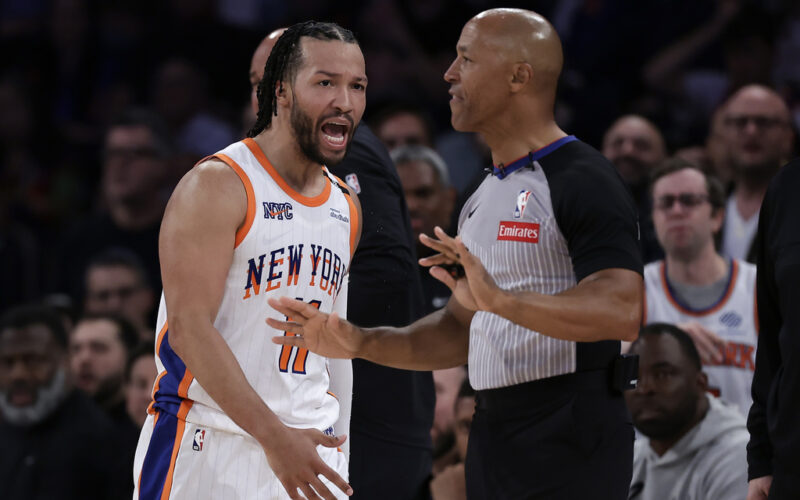Jalen Brunson and Josh Hart could only watch.
From the scorer’s table — not the court — two of the Knicks’ key players stood sidelined as Game 5 slipped through their fingers.
The Knicks had a chance to win a playoff series at Madison Square Garden for the first time since 1999. Instead, they burned through too many timeouts, sustained fourth-quarter injuries to both Brunson and Hart, and left their fate to a group that didn’t include their most trusted veterans.
By the time Brunson and Hart were cleared to check back in, Knicks head coach Tom Thibodeau had a decision to make: call his final timeout, intentionally foul, or wait for a dead ball to make the subs. He chose to wait.
By the time that whistle came, the Pistons had built a six-point lead. Mikal Bridges hit a clutch corner three. OG Anunoby followed with a contested triple that missed with under six seconds remaining. The Knicks’ rally came up short, and the Pistons — 3-1 underdogs walking into The Garden — walked out with a 106-103 win to stay alive.
Now the Knicks, who gutted out two wins in hostile territory, will head back to Little Caesars Arena for a must-win Game 6.
They’ve already proven they can win in Detroit. But now, with injuries mounting, fresh legs fading, and the Boston Celtics waiting fully rested and healthy, the pressure has officially shifted back onto New York’s side.
The margin for error? Gone.
It’s not just about closing the series. It’s about conserving the energy they’re going to need to face a reigning champion that swept them 4–0 in the regular season — with three of those games decided by double digits.
That opportunity was right in front of them. Instead of Brunson — the league’s Clutch Player of the Year — and Hart — his most intuitive on-court partner — the Knicks closed Game 5 with Cameron Payne and Miles McBride on the floor. Karl-Anthony Towns was out there too, but this time, his impact didn’t match the moment.
After torching the Pistons down the stretch in Game 4, Towns finished with 17 points on 5-of-14 shooting in Game 5, never finding rhythm and spending much of the game navigating foul trouble.
“At that size where his release point is, it’s tough to challenge [him],” Pistons head coach J.B. Bickerstaff said before tipoff, reflecting on Towns’ last performance. “So you tip your hat to him ‘cause he is an elite offensive player… but again, how did he get there? The stepback off the bounce you live with. But there were a couple catch-and-shoots that I felt we could have done a better job of getting to him sooner.”
Meanwhile, the Knicks continued to ride the roller coaster of Mikal Bridges’ production. In Detroit, he went cold for two quarters. In New York, it happened again.
Bridges missed seven of his first eight shots on Tuesday and finished 7-of-17 from the field for 18 points — 13 of which came in the fourth quarter. He’s made timely buckets and played strong defense on Cade Cunningham, but for a player the Knicks traded five first-round picks to acquire, the team still needs more. Especially against Boston, where shot creation — and shot making — will be at a premium.
Entering Game 5, Bridges was shooting just 42 percent from the field and 32 percent from deep in the series. That lack of consistency has stalled early momentum, and Tuesday was no exception.
Even when Bridges found his stride late, the Knicks had already missed too many chances to pull away.
And now they’re flying back to Detroit — a city where they eked out wins by the slimmest margins, including a Game 4 win gifted in part by a missed foul call at the buzzer.
The Pistons didn’t make anything easy. Game 6 won’t be, either.
“The way we have to look at it is, what is it going to take to win the game,” Thibodeau said ahead of tipoff. “Anytime you’re facing an opponent that’s looking at a close-out situation, you know you’re going to get great intensity in the game. And we have to play great for 48 minutes. What goes into that? Intensity, intelligence and togetherness.”








